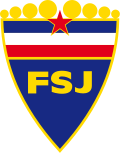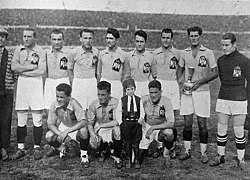Yugoslav national football team

|
|||||||||||||||||||
| Nickname (s) | Plavi (The Blue) | ||||||||||||||||||
| Association | Фудбалски Савез Југославије / Fudbalski Savez Jugoslavije (Serbian) Nogometni Savez Jugoslavije (Bosnian and Croatian) Nogometna Zveza Jugoslavije (Slovene) сулаваски солова (Slovenian) удбалЈudз ослова удбалЈзbи ослада удбалЈзbи осла J |
||||||||||||||||||
| confederacy | UEFA | ||||||||||||||||||
| Head coach | Ivica Osim (last) | ||||||||||||||||||
| Record scorer | Stjepan Bobek (38) | ||||||||||||||||||
| Record player | Dragan Dzajic (85) | ||||||||||||||||||
| Home stadium | Red Star , Belgrade | ||||||||||||||||||
| FIFA code | YUG | ||||||||||||||||||
|
|||||||||||||||||||
| statistics | |||||||||||||||||||
|---|---|---|---|---|---|---|---|---|---|---|---|---|---|---|---|---|---|---|---|
|
First international match Kingdom of Serbs, Croats and Slovenes 0: 7 Czechoslovakia ( Antwerp , Belgium ; August 28, 1920 )
|
|||||||||||||||||||
|
Last game Yugoslavia 7-0 Faroe Islands as SFR Yugoslavia (with all republics) ( Belgrade , Yugoslavia ; May 16, 1991 ) Netherlands 2-0 Yugoslavia as SFR Yugoslavia (without Croatia and Slovenia) ( Amsterdam , Netherlands ; March 25, 1992 )
|
|||||||||||||||||||
|
Biggest wins Yugoslavia 10: 1 India ( Helsinki , Finland ; July 15, 1952 ) Yugoslavia 9: 0 Zaire ( Gelsenkirchen , Germany ; June 18, 1974 )
|
|||||||||||||||||||
|
Biggest defeats Kingdom of Serbs, Croats and Slovenes 0: 7 Czechoslovakia ( Antwerp , Belgium ; August 28, 1920 ) Kingdom of Serbs, Croats and Slovenes 0: 7 Uruguay ( Paris , France ; May 26, 1924 ) Czechoslovakia 7: 0 Kingdom of Serbs, Croats and Slovenes ( Prague , Czechoslovakia (now Czech Republic ); October 28, 1925 )
|
|||||||||||||||||||
| Successes in tournaments | |||||||||||||||||||
| World Championship | |||||||||||||||||||
| Participation in the finals | 8 ( first : 1930 ) | ||||||||||||||||||
| Best results | Semi-finals 1930 , fourth place 1962 | ||||||||||||||||||
| European Championship | |||||||||||||||||||
| Participation in the finals | 4 ( first : 1960 ) | ||||||||||||||||||
| Best results | Vice European Champion 1960 , 1968 | ||||||||||||||||||
|
|||||||||||||||||||
| (Status: dissolution of Yugoslavia / legal successor Serbia) | |||||||||||||||||||
The Yugoslav national football team ( Serbo-Croatian : Jugoslovenska Fudbalska Reprezentacija / Jugoslavenska nogometna Reprezentacija / Југословенска Фудбалска репрезентација ) was an existing 1920-1992 football - selection , which - in many international - are very successful tournaments participated.
history
Ten years after the Yugoslav Football Association was admitted to FIFA , one of the greatest international successes in the association's history was celebrated in 1930 with reaching the semi-finals of the first football World Cup . On the international stage, light and shadow often alternated in the following decades. The national team took part in a number of European and World Championships and was even twice European runner-up. In other years, however, it could not qualify for the relevant finals. The association and the national team experienced their bitterest times in the first half of the 1990s. During the years of the break-up of Yugoslavia and the wars in this region, the national soccer team was not allowed to qualify for European or World Cups several times.
The situation was darkest before the 1992 European Football Championship : Yugoslavia had already qualified for this tournament, but was then excluded from UEFA because no team could represent the disintegrated Yugoslavia. Denmark, which was actually not qualified, moved up and finally became European champions.
Something strange happened on June 7, 1983 before the game between Yugoslavia and the German national soccer team in Luxembourg on the occasion of the 75th anniversary of the Luxembourg Association. As the Yugoslav national anthem, the anthem of the Kingdom of Yugoslavia from 1929 to 1941 was accidentally played. Thereupon the Yugoslavs refused to compete until their correct (then current) anthem was played. This only happened after about an hour and a half.
International competitions
The national team at the Olympic Games
| 1908 in London | not participated |
| 1912 in Stockholm | not participated |
| 1920 in Antwerp | Preliminary round |
| 1924 in Paris | qualification |
| 1928 in Amsterdam | Round of 16 |
| 1936 in Berlin | not participated |
| 1948 in London | Second |
| 1952 in Helsinki | Second |
| 1956 in Melbourne | Second |
| 1960 in Rome | Olympic champion |
| 1964 in Tokyo | Quarter finals |
| 1968 in Mexico City | resigned in qualification |
| 1972 in Munich | not qualified |
| 1976 in Montreal | not qualified |
| 1980 in Moscow | Fourth |
| 1984 in Los Angeles | Third |
| 1988 in Seoul | Preliminary round |
The national team at world championships
| year | Host country | Participation until ... | Last opponent | Result | Trainer | Comments and special features |
|---|---|---|---|---|---|---|
| 1930 | Uruguay | Semifinals | Uruguay | Fourth | Boško Simonović | no game for 3rd place |
| 1934 | Italy | not qualified | In qualifying at the Switzerland and Romania failed | |||
| 1938 | France | not qualified | Failed in the qualification to Poland | |||
| 1950 | Brazil | Preliminary round | Switzerland , Mexico , Brazil | 5. | Milorad Arsenijevic | |
| 1954 | Switzerland | Quarter finals | Germany | 7th | Aleksandar Tirnanić | |
| 1958 | Sweden | Quarter finals | Germany | 5. | Aleksandar Tirnanić | |
| 1962 | Chile | 3rd place match | Chile | Fourth | Ljubomir Lovrić | Failed in the semi-finals against Czechoslovakia . Dražan Jerković scores as many goals as Garrincha, who was drawn as top scorer |
| 1966 | England | not qualified | In the qualification of France failed | |||
| 1970 | Mexico | not qualified | In the qualification of Belgium failed | |||
| 1974 | Germany | Intermediate round | Germany , Poland , Sweden | 7th | Miljan Miljanić | The 9: 0 in the preliminary round against Zaire was the highest World Cup victory until June 15, 1982 |
| 1978 | Argentina | not qualified | In the qualification of Spain failed | |||
| 1982 | Spain | Preliminary round | Northern Ireland , Spain , Honduras | 16. | Miljan Miljanić | |
| 1986 | Mexico | not qualified | In the qualification of France and Bulgaria failed | |||
| 1990 | Italy | Quarter finals | Argentina | 5. | Ivica Osim | Out on penalties |
The national team at European championships
Yugoslavia was able to qualify for every second European Championship finals, twice with four participants, one time being the host, and twice with eight participants. After the last qualification, however, the exclusion took place shortly before the start of the tournament. Yugoslavia was replaced by Denmark, which won the title.
| year | Host country | Participation until ... | Last opponent | Result | Comments and special features |
|---|---|---|---|---|---|
| 1960 | France | final | USSR | 2nd place | |
| 1964 | Spain | not qualified | In the second round to Sweden failed. | ||
| 1968 | Italy | final | Italy | 2nd place | Defeat in replay |
| 1972 | Belgium | not qualified | Failed in the quarter-finals at the USSR | ||
| 1976 | Yugoslavia | 3rd place match | Netherlands | Fourth | In the semifinals to defending champion Germany only failed in extra time. |
| 1980 | Italy | not qualified | In the qualification of Spain failed | ||
| 1984 | France | Preliminary round | Belgium , Denmark , France | Eliminated after three defeats as bottom of the group | |
| 1988 | BR Germany | not qualified | In the qualification of England failed | ||
| 1992 | Sweden | qualified , but excluded from the tournament because of the wars in Yugoslavia . | The other previous republics of Yugoslavia were against the participation of Serbia and Montenegro in the EM on behalf of Yugoslavia. |
Important players and coaches
Players with the highest number of goals in international matches
- Stjepan Bobek : 38
- Milan Galić : 37
- Blagoje Marjanović : 36
- Rajko Mitić : 32
- Dušan Bajević : 29
- Todor Veselinović : 28
- Bora Kostić : 26
- Zlatko Vujović : 25
- Dragan Džajić : 23
- Bernard Vukas : 22
- Safet Sušić : 21
- Slaven Zambata : 21
- Đorđe Vujadinović : 18
- Muhamed Mujic : 17
- Darko Pančev : 17
- Branko Zebec : 17
- Miloš Milutinović 16
- Aleksandar Živković : 15
- Dejan Savićević : 14
- Željko Čajkovski : 12
- Aleksandar Tirnanić : 12
Best goalkeeper
- Enver Marić : 32
- Vladimir Beara : 59
- Tomislav Ivković : 38
- Milutin Soškić : 49
Trainer
-
 Boško Simonović (1930-1935, 1939-1940)
Boško Simonović (1930-1935, 1939-1940) -
 Aleksandar Tirnanić (1948–1958) (?)
Aleksandar Tirnanić (1948–1958) (?) -
 Ljubomir Lovrić (1959–1964)
Ljubomir Lovrić (1959–1964) -
 Miljan Miljanić (1965–1966, 1973–1974, 1979–1982)
Miljan Miljanić (1965–1966, 1973–1974, 1979–1982) -
 Rajko Mitić (1967–1970)
Rajko Mitić (1967–1970) -
 Vujadin Boškov (1971–1973)
Vujadin Boškov (1971–1973) -
 Tomislav Ivić (1973–1974)
Tomislav Ivić (1973–1974) -
 Todor Veselinović (1982-1984)
Todor Veselinović (1982-1984) -
 Ivica Osim (1986-1991)
Ivica Osim (1986-1991)
See also
- Yugoslav national football team (U-17 juniors)
- Yugoslav national football team (U-20 men)
- Yugoslav national football team (U-21 men)
Web links
- All Yugoslav national players from 1964–1992
- All games, results and line-ups of the Yugoslav national team
Individual evidence
- ↑ The placements from 5th place onwards were determined by FIFA without any placement games. See: All-time FIFA World Cup Ranking 1930-2010 (there under Results for Serbia; PDF; 200 kB)
- ↑ http://de.fifa.com/worldcup/archive/edition=1/index.html

